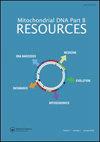日本雪域特有种阴道堇菜(堇菜科)的叶绿体全基因组。
IF 0.5
4区 生物学
Q4 GENETICS & HEREDITY
Mitochondrial DNA. Part B, Resources
Pub Date : 2024-12-24
eCollection Date: 2025-01-01
DOI:10.1080/23802359.2024.2444595
引用次数: 0
摘要
堇菜,一种多年生草本植物,在日本的日本海一侧的雪山地区特有。其叶绿体基因组全长156056 bp,包括1个大单拷贝区(86,407 bp)、1个小单拷贝区(17,301 bp)和2个反向重复区(各27,174 bp)。包含111个独特基因,其中蛋白质编码基因77个,转移RNA基因30个,核糖体RNA基因4个。系统发育分析结果表明,V. vaginata与部分Biobatae种和部分髌骨种属于一个分支,而其他髌骨种则是一个独立的分支。这些发现突出了堇菜的系统发育复杂性。本文章由计算机程序翻译,如有差异,请以英文原文为准。
The complete chloroplast genome of Viola vaginata (Violaceae), an endemic species of the snowy region in Japan.
Viola vaginata, a perennial herb in subsection Stolonosae, is endemic to the snowy mountainous regions on the Sea of Japan side of Japan. Its complete chloroplast genome was 156,056 bp in length, comprising one large single-copy region (86,407 bp), one small single-copy region (17,301 bp), and two inverted repeat regions (27,174 bp each). It contained 111 unique genes, including 77 protein-coding genes, 30 transfer RNA genes, and 4 ribosomal RNA genes. Phylogenetic analysis placed V. vaginata in a clade with subsection Biobatae species and some Patellares species, while other Patellares species formed a distinct clade, contrasting with previous nuclear ITS results. These findings highlight the phylogenetic complexity within Viola.
求助全文
通过发布文献求助,成功后即可免费获取论文全文。
去求助
来源期刊

Mitochondrial DNA. Part B, Resources
Biochemistry, Genetics and Molecular Biology-Molecular Biology
CiteScore
1.30
自引率
20.00%
发文量
670
期刊介绍:
This open access journal publishes high-quality and concise research articles reporting the sequence of full mitochondrial genomes, and short communications focusing on the physical, chemical, and biochemical aspects of mtDNA and proteins involved in mtDNA metabolism and interactions.
 求助内容:
求助内容: 应助结果提醒方式:
应助结果提醒方式:


